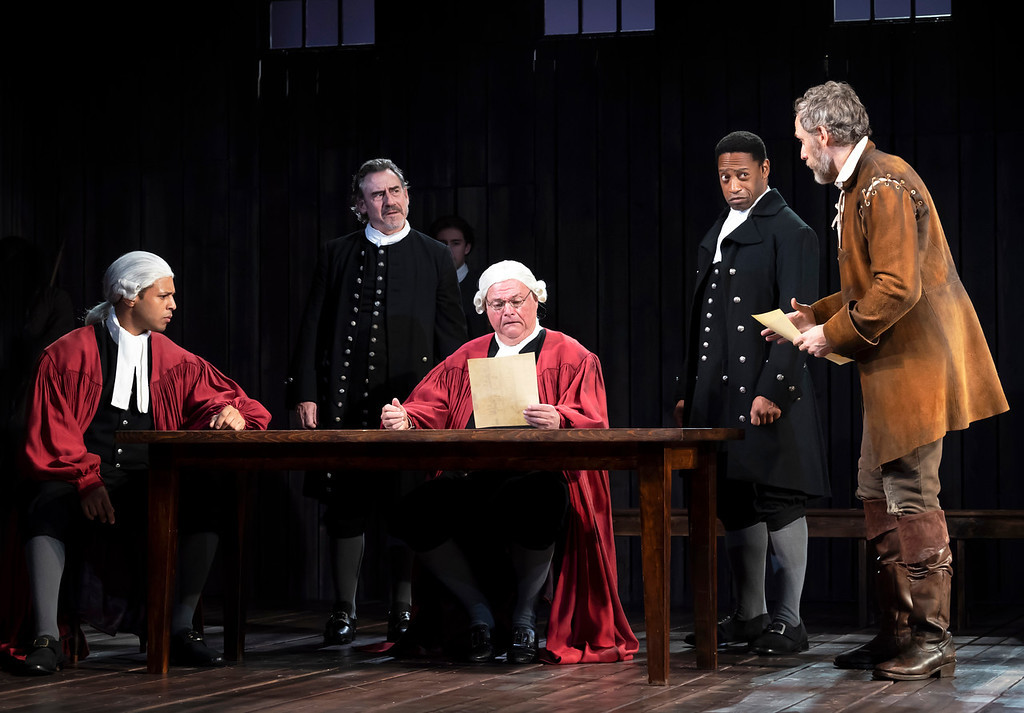Review: THE CRUCIBLE at Asolo Repertory Theatre

The Crucible, originally titled, Those Familiar Spirits, is a play by Arthur Miller written in 1953 as a fictionalized portrayal of the Salem witch trials, taking place in Massachusetts in the late 1600's. It won a Pulitzer Prize and Tony Award for Best Play on Broadway in 1953. The Crucible is Miller's nod to the days of McCarthyism when the US government tried and persecuted people thought to be involved in communist activities.
Miller himself was convicted of contempt of Congress when he refused to name attendees at certain meetings he frequented. In order to avoid sentencing and blacklisting, individuals, many in the entertainment industry, were pressured to provide names. Miller picked up on the German-Jewish playwright Lion Feuchtwanger's play about the Salem witch trials. Feuchtwanger's version, The Devil in Boston was an allegory for the persecution of communists during the McCarthy-era.
Much has been said, written and speculated about the Salem witch trials, a time where people were accused of crimes they may or may not have done. The suspicions and gossip of others who let their imaginations go wild and perhaps embellished on the storyline as each person leaned to the next to disclose their rendition. Skepticism, hypocrisy, conjectures and mistrust plagued the trials. This was true during the McCarthy-era and unfortunately true today.
The Asolo's version of The Crucible was staged in 2 acts, which made it seem long and rather drawn out. It was originally written in 4 acts. Although the pace for me was a bit slow, Michael Donald Edwards, in his 13th season as Producing Artist Director, brings to life this captivating story following the delusion, betrayal and eventual frenzy that gripped the Massachusetts Bay Colony. As friends and neighbors, pastors and high-ranking church officials try to determine why a select few of the colony's young women were found in a trance-like state, local and religious authorities take pious aim at those afflicted. With each new accusation, the trials take a turn against everyone and anyone. One person thought he saw one of the girls naked. Another one swore one of the girls was flying through the air.
It's hard and even frustrating to watch the frenzy unfold. How cruel. How unfair. Something as innocent as a group of young women dancing in the forest, lead to accusations of possibly conjuring up Satan. Dancing was forbidden in the Puritan sect; therefore a quick decision linking the girls to satanic rituals offered an immediate conclusion. However, the young ladies were lead astray by Abigail Williams (Amanda Fallon Smith), who had an affair with John Proctor (Coburn Goss), a former employer. She will stop at nothing to get Proctor back and schemes to point the finger at his wife, Elizabeth (Laura Rook), hoping it will lead to her being put to death as suspicions lean in her direction.
Coburn Goss believably portrayed John Proctor as a tormented man trying to do right by his wife and children. Laura Rook is cautious in spirit and temperament as his wife Elizabeth. Amanda Fallon Smith brings a level of depth to her Dr. Jekyll Mr. Hyde character, Abigail. David Breitbarth as Reverend Parris embodies the conviction of his pastoral character, as does Gabriel Lawrence playing Reverend Hale. Danielle Lee Greaves as the slave Tituba gave a respectable performance, as did the rest of the fine cast. Particularly strong characters arise in Andrew Hardaway as Judge Hathorne and Matt DeCaro governing the trials as Deputy-Governor Danforth.
Lee Savage's set of interchangeable, stark rooms and drab slats of wood that allowed some light at times and the brilliance of piecing rays at others, combined well into the storyline, infused by lighting designer Jen Schriever's jolting display of effects.
Although the storyline is not a happy one, it rings true even today amongst the unrest we see in the daily news. It's worth seeing The Crucible because it is a timeless story, an award winning drama, for good or for worse, and a part of American history that we keep re-living in some way, generation after generation.
The Crucible runs through March 10, 2019 at Asolo Repertory Theatre. To learn more about the Asolo and their upcoming productions, visit www.asolorep.org.
Videos
